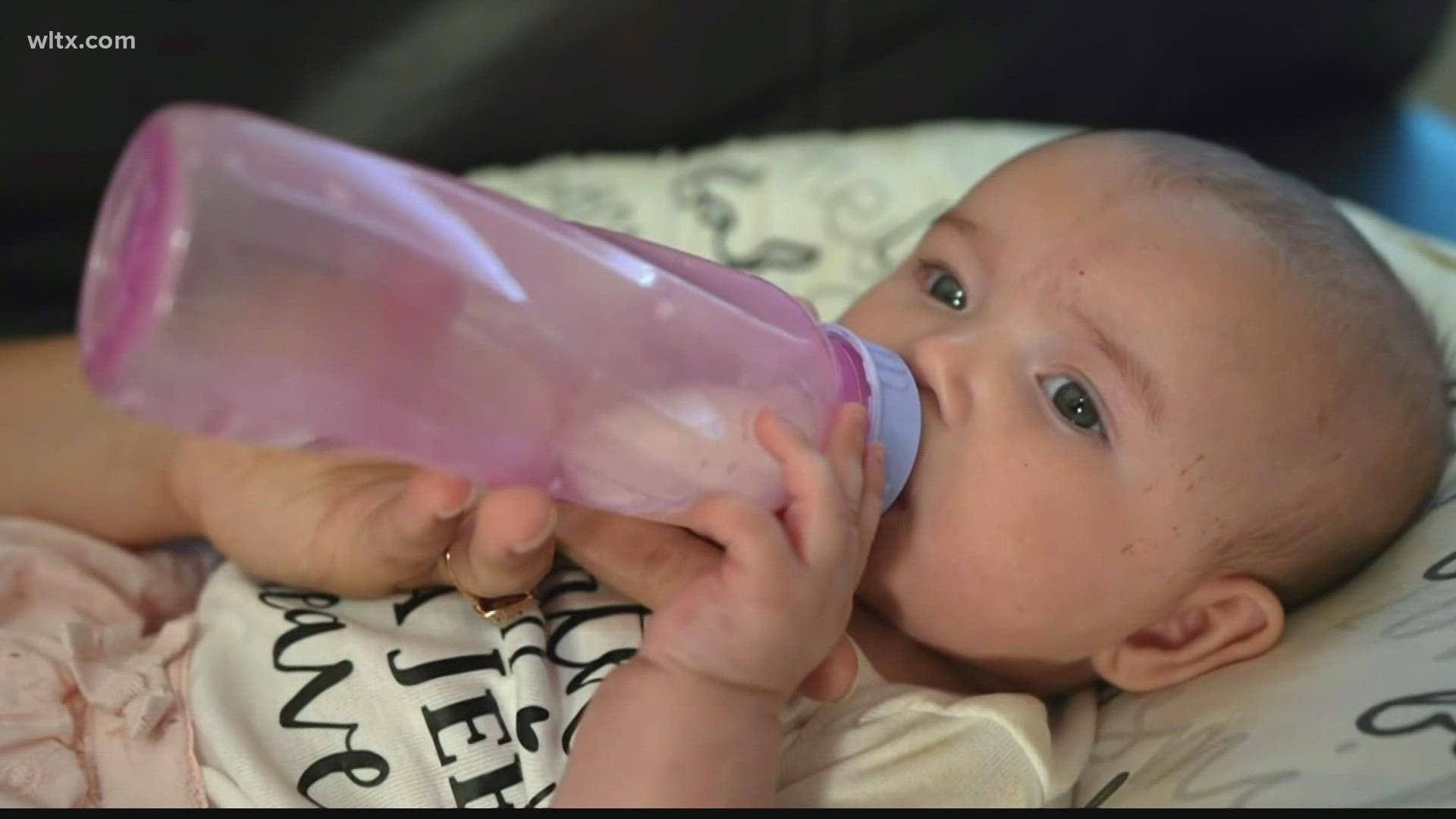COLUMBIA, S.C. — A milk bank in South Carolina is helping to ease the formula shortage for some families, thanks to the generosity of milk donors.
A 20% to 25% increase in breast milk donations to the Mother’s Milk Bank means the nonprofit, developed by the Medical University of South Carolina, can expand its offerings at a time when some families are struggling to feed their babies due to a formula shortage.
“Our primary purpose is to help serve the NICU community,” said milk bank manager Lindsay Millonzi, referring to hospitals’ neonatal intensive care units. “However, right now, with an increase in donations, we are able to also have that service available to families who might need donor milk.”
Families interested in buying from the milk bank can apply on its website (fill out the “get involved” form and look for the “I am interested in” option) or call 843-792-5415 between 9 a.m. and 4 p.m. weekdays. Once families reach out, a milk bank team member will call to go over requirements and the process.
Millonzi explained how the donor milk gets to the bank. It’s a rigorous process. “When a mom has an oversupply of breast milk, she will reach out to us through our website or call. And the first step is a 15-minute phone screening where we discuss pertinent information like lifestyle, health and medications,” she said.
“As long as the mom meets the criteria, she will then complete a donor packet consisting of more health and lifestyle questions. Once that’s been completed and sent back to us, mom’s OB-GYN will be asked to complete a form, recommending her as a donor.”
Then, they set up the mother with a blood test – paid for by the milk bank.
“Finally, one of our team members, along with the director, will review the whole chart, from the phone screening, the paperwork, the OB-GYN form, the lab work, make sure everything is within our guidelines. Once mom is approved, we send out a donor packet. And in that donor packet, it will let her know where to donate.”
There are depots all over the state for milk drop-offs. But Millonzi said vetting the women who contribute through them isn’t the only thorough aspect of the milk bank’s system. “Once the milk is on-site, it’s carefully processed and pasteurized by the lab technicians. Following pasteurization, the milk is tested for bacteria to ensure safety and quality.”
Milk that passes the test is then ready for when a hospital – or, now, a qualified family – puts in a request.
Millonzi said the milk bank, which is supported by MUSC Children’s Health, the South Carolina Neonatal Consortium, the South Carolina Birth Outcomes Initiative and Healthy Me, Healthy SC, has to stay flexible in terms of how much it can offer to the public because hospital demands and mothers’ donations vary from month to month. Its managers also have to keep costs in mind.
“We’re a nonprofit. We don’t make money off selling milk. The money we get goes to equipment, paying staff, running tests on the milk, buying bottles and supplies, and we provide free breast milk bags to our donors. There’s a lot that goes into it.”
Millonzi called the generosity of the women who donate their extra breast milk to help other families awe-inspiring. “Without them, this wouldn’t be possible. They love the idea of South Carolina moms helping other South Carolina families and babies.”
The milk bank, the only one in South Carolina, is accredited by the Human Milk Banking Association of North America, one of 31 milk banks across the country that are part of the association.
Millonzi said the formula shortage has raised awareness about how precious breast milk is – and how important the milk bank’s mission is. “Some moms are donating now because they realize other families are having trouble finding formula due to the shortage. We’ve had several say, ‘This situation has made me realize that I have the ability to help and give to this cause. Whereas I wouldn’t have really thought about it before.’ We’re just so appreciative of our donors. Not just right now, but through all the years.”
Once approved, here's where you can donate milk in the Midlands:
Lexington County Cooperative Clemson Extension Service
605 West Main Street, Suite F
Lexington, SC 29072
803-359-8515
Orangeburg County Cooperative Clemson Extension Service
1550 Henley Street, Suite 200
Orangeburg, SC 29115
803-534-6280
Prisma Health Baptist
Taylor & Marion Street
Columbia, SC 29220
803-296-2372
Prisma Richland
5 Richland Medical Park
Columbia, SC 29203
803-434-6961
Richland Health Department
2000 Hampton Street
Columbia, SC 29204
803-576-2980
Sumter County Health Department
105 North Magnolia Street
Sumter, SC 29150
803-773-5511

